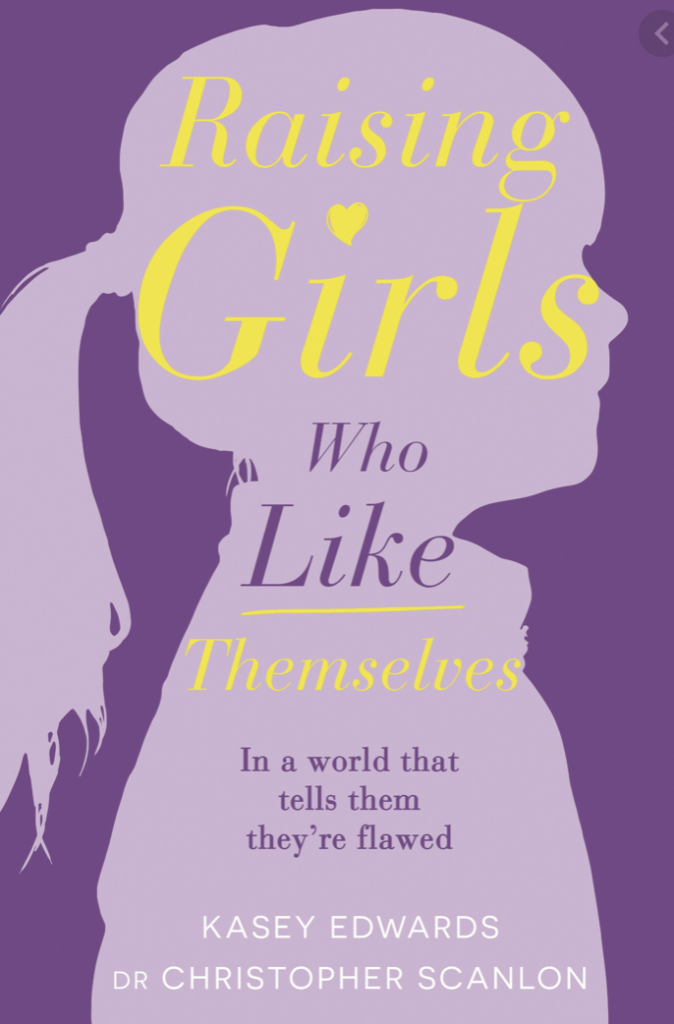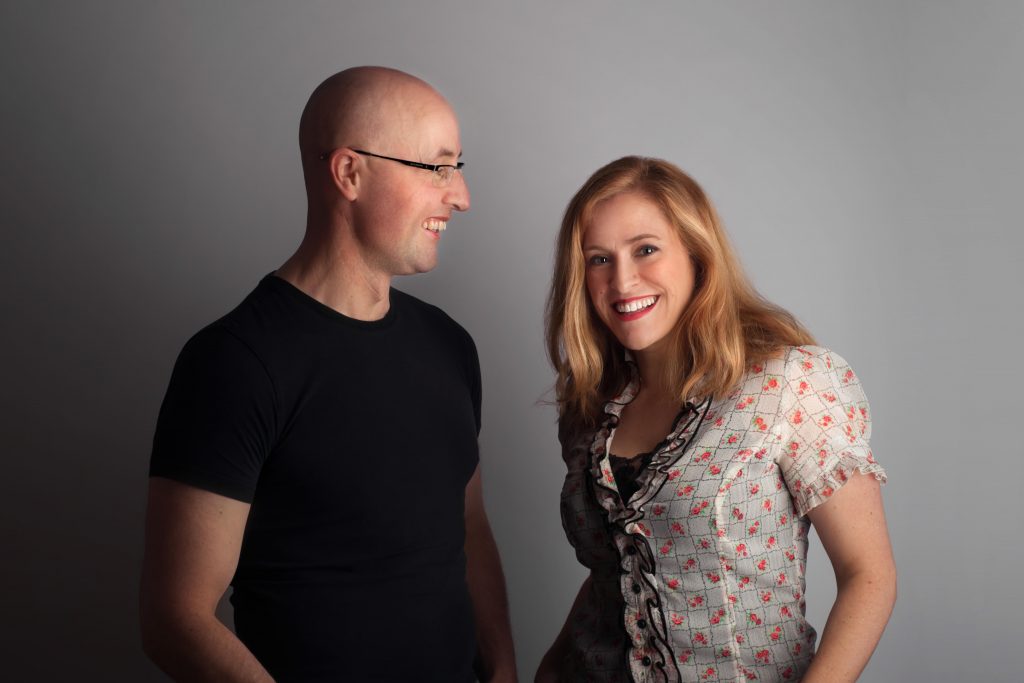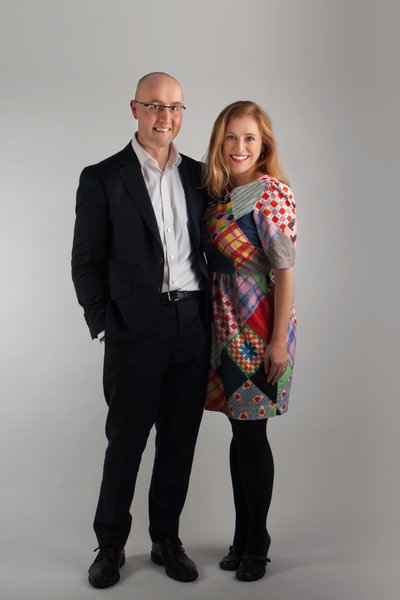It is a great pleasure to have Kasey Edwards and Dr Christopher Scanlon for our ‘Behind the Book’ segment. For the unknown, Kasey Edwards and Dr Christopher Scanlon are a husband-and-wife team who’ve written several books, including two young adult fantasy novels. Their latest book, Raising Girls Who Like Themselves: in a world that tells them they’re flawed hopes to bring a significant change in the world in raising young girls who’re free from the chain of insecurities and can fully accept themselves for who they truly are. Read on!
Ques- How did you come up with the title Raising Girls Who Like Themselves?
Kasey- We have two girls. I want them to grow up liking themselves more than I did when I was growing up. It occurred to me that even though when I grew up I had all these external markers of success; from the outside I looked like a successful happy girl. But I was crippled by insecurity, and I just grew up never ever believing that I was enough. And it wasn’t just me who felt like that, my friends felt like that and then we realised our mothers felt like that too and it just is passed through the generations of this insecurity, so we wanted to work out how we could break that cycle and raise girls who actually liked themselves.
Ques- So how long have you been writing this book? Was there a redefining moment when you decided the book must be written?
Kasey- It was 10 years in the making.
Christopher- Both of us are journalists and we’re both always researching, writing about parenting. We had a motivation because we have daughters. But it didn’t really crystallise as a book until we went at a party where Kasey was sharing our research with other parents when a friend just said, “I don’t need to know all the details, Can you just tell me what I need to do? We’ve put it in the book too.
Ques- How different was the writing experience for this book compared to your previous releases?
Kasey- I think all of the books that we have written, have been solving a problem that we had in our life at the time. My very first book was 30 something and over it. Back then I was fixing that problem for myself and then the next one was about motherhood and the young adult fantasy series that we wrote together under the pen name Violet Grace, we were solving a problem there too. Because our Violet was getting older and she was starting to read books that worried us about the representation of romance, and psychotic boyfriends. We wanted to write a story that showed that emotional intelligence was a desirable characteristic in a love interest. We wanted to show that it’s desirable for girls to be powerful, so that’s why we wrote that. This one’s more than a book for us, this is what we want to change in the world.
Ques- What has been your biggest takeaway from writing this book?
Kasey- What surprised me the most was the number of women reading it for their own benefit. We were at the young Castlemaine State Festival, talking about our book. A middle-aged woman came up afterwards and she was crying. She said, ‘I’m so moved by what you just said.’ I asked her if she has a girl. She said no but she was one. And I think that’s what surprised me. In a way this book is like a love letter to the little girls.
Christopher- I think the biggest thing for me too is how much of what we wrote down has a big effect and response from the audience. A lot of what we’re talking about are small daily changes; about how you speak to girls, how you engage with them in social situations. We’re not talking about massive changes to your lifestyle- these are small steps, but I think the key is to get consistency over time.
Ques- You wrote in your book that children don’t need perfect parents. All they need are ‘good enough‘. How do you define what is good enough?
Kasey- That’s a very nice question! I think there’s so much pressure on parents to create the perfect childhood where it’s just fairies, unicorns and marshmallows every day. But what we worked out through our research is that by doing what we think is expected to be perfect, we’re actually robbing our girls of the opportunity to experience growth and learn through disappointments. So, I think not being perfect is a learning opportunity to that.
Christopher- I think you don’t have to be perfect as a parent all the time. Parents need to know that it’s okay to feel that frustration. The family life is not going to be perfect, it never has been, but the willingness to be better, and to have an open conversation with the children in age-appropriate ways can make the journey softer.
Kasey- One of the concerning things is about body image. We also spoke in the book that parents are told, to tell their daughter- she’s beautiful. But when she can’t reach that expectation, we’re setting her up for failure. There’s lots of conversation in families about fat chat, diets and body hatred and parents feel like the damage has been done. Let’s just leave the past behind and look forward. I also know that I like myself better now, having written that book than I did beforehand. If I can, at the age of forty-four help myself like myself more than we can do that for a girl who you know is seven or eight.

Ques- Christopher, thank you for addressing the role of fathers in raising a girl who’s confident and like herself. However, there’s still a lot of reluctance from the dad community to help and contribute to the growing age of their daughters. What’s your take on it?
Christopher- I think there’s a lot greater willingness of dads to step up. But I also think there’s a way to go, and this is partly why we included those short sections for the dads in the book. A lot of mainstream parenting books aren’t even aimed at dads and are targeted at mothers alone. Men generally do not tend to read books so this was an attempt to provide a short takeaway after the end of every chapter. If you’re not into reading; here is the cheat sheet. There’s also a cultural problem that expects men to be available for work and that’s going to be the priority. Men often police each other. I remember telling my workmates that I’m going to leave now, and it was about eight o’clock anyway. I said I’ve got a baby at home and I remember getting comments like, ‘Oh really’, you’re not going to stay on, we’re not talking, this is not the 1980s’.
Kasey- It felt like an accusation that I’m making him come back and not because he wants to be home, spend time with our daughter.
Christopher- They say your priorities have changed. That expectation still exists for men and they need to have a conscious effort to push back against that. To admit that the priorities have indeed changed. Because this is the most important phase in our lives. Our daughter Violet is down in grade six now, and I noticed when she was in her earlier grades I could see more dads around at either childcare or during the early primary schooling. You start observing fewer dads as the kids get older. It’s like they’re growing older and they’re on their own. And that’s a real mistake. There’s a real message here for guys to get involved and then to stay involved. They’re often the one who is less available so that’s really important to make sure they know their priority.
Ques- I am curious to know how are you with your girls. Are you friends with them or more like parents?
Kasey- Definitely parents. I think children need to know that someone is in charge, and that gives them safety. They want boundaries, and I think it is a gift to children and for parents to be parents. That doesn’t mean we don’t play, have fun with our kids. We absolutely do lots of jokes. We have the lovely connection from play, but we’re still in charge.
Ques- And when you’re not reading, writing, or taking care of your girls, what do we see you doing?
Kasey- Well that’s all we do (laughs). Writing is our job and it’s also our hobby. We really enjoy writing and working together. We are working on a novel at the moment.
Christopher- I think we’re completely boring. We’re lucky that our hobbies and our work match with each other.
Ques- You spoke in an interview somewhere that you want a very different approach for your girls, not the mainstream one that has been using over the time. So I want to know what is the approach that you are using for your family?

Kasey- We want our girls to know that their opinion about them and their work, their appearance, and their choice of friends matter more than anyone else’s including ours. When a girl gets to the age of nine or ten; very often they are aware of what other people think, and this can affect their whole lives. In many ways, we have been preparing our girls for this algos for this moment.
Ques- You make an amazing writing team but how do you guys come up with the creative differences which are natural to come along?
Christopher- Kasey writes the first draft. Then I go over it and write over it. She checks it back. So by the time, we get to the end point; you can’t really tell whose voices are you reading. It almost becomes a third author. Our upcoming fiction has probably witnessed the biggest fight we’ve ever had. It was about what happened in our fictional world. It was funny.
Kasey- I think the way we write together is a metaphor for our relationship, in that we both respect each other. Chris’s advice or feedback isn’t mean, it’s not superior. It’s a genuine attempt to make the craft look better.
Christopher- It’s also that Kasey could run the story as I could never do in a million years. She has a capacity to just nail it like what would have taken me five pages of analysis.
Ques- What are you working on next?
Kasey- We’re working on a psychological thriller set in rural Victoria. We haven’t done one of these before. Part of our problem as writers is that we don’t stick to the same genre and jump around. We both really like learning new things. It’s a new challenge.
Ques- If the book gets adapted into a Netflix series, whom do you want to cast to do the narrative?
Kasey- Oh gosh, what a lovely idea! Thank you so much for suggesting something so magnificent.
Christopher- I would go for Vin Diesel. We’ve got the same haircut.
Kasey- I’m gonna think about it and get back to you.
Read our review for Raising Girls Who Like Themselves here.
Raising Girls Who Like Themselves by Kasey Edwards and Dr Christopher Scanlon was published on 2nd February 2021 by Penguin Books Australia. You can purchase the book here.
